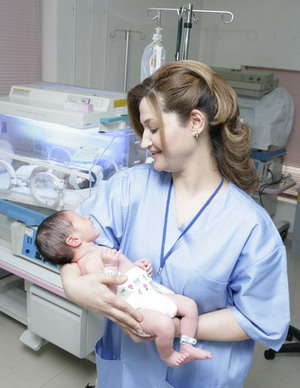
3 May 2018 - On 5 May every year, the world celebrates International Day of the Midwife, with the theme of this year’s campaign being “Midwives leading the way with quality care”. The theme is in line with the first of 3 strategic directions of the International Confederation of Midwifes namely, quality, equity, and leadership.
Maternal health care services are highly dependent on midwifery care, including the role of midwives in responding to the needs of women, families and communities. Reaching every woman and newborn with midwifery services is essential to achieve health-related Sustainable Development Goal 3, particularly targets 3.1 and 3.2, to reduce maternal and neonatal mortality, and target 3.8, to achieve universal health coverage. As the global health community is striving to move towards universal health coverage for 2030, it is essential to address gaps in human resources for health, improve the quality of care for women and newborns, and ensure women’s use of midwifery services.
Midwifery care provided by well-trained and qualified midwives is cost effective, affordable and sustainable. WHO and its Member States have been working closely to improve the quality of midwifery care and a framework for action has been developed to provide support to Member States to achieve this goal. We strongly believe that midwives are enablers, initiators, organizers and the essential link in bringing women to the health care system at the most effective time.
Despite progress in reducing the numbers of avoidable deaths related to pregnancy, birth and the postpartum period, continued success in achieving international targets and meeting new challenges will require substantial investment in midwifery education and training. Lack of understanding of midwifery, low status of women, inter-professional rivalry, and unregulated commercialism of childbirth need to be addressed to scale up quality of maternal and newborn health care and reduce maternal and newborn mortality. The contribution of midwifery is central to achieving quality maternal and newborn care and a more equitable and healthy society.
Providing quality care depends on the availability of practising, skilled midwives who can lead and contribute to the care of women as part of a multidisciplinary team. Women and their families expect a service that provides clear communication, effective teamwork, a safe environment and continuity of care. The midwife’s role is to ensure that these expectations are understood and met.
WHO is committed to supporting the roles of midwives in ensuring that women and their newborn babies navigate pregnancy and childbirth safely, but also receive respectful and well-resourced maternity care that can create a lifetime of good health and well-being beyond childbirth. We should not forget that midwives are unsung heroes in responding to the health needs of communities affected by emergencies in our Region and provide the first line of contact with women and their families.
On the International Day of the Midwife, we call on all governments and health sector stakeholders to invest in midwives, education, regulation, work environment and management. This is a cost-effective move that can improve the quality of maternal care in all countries.



